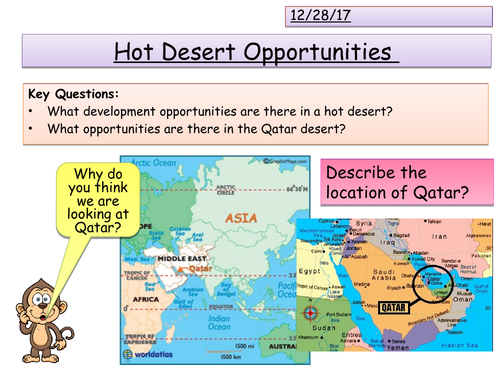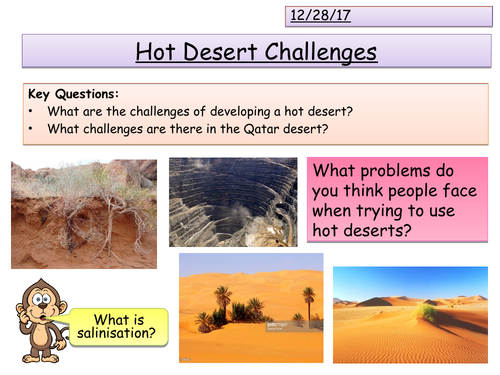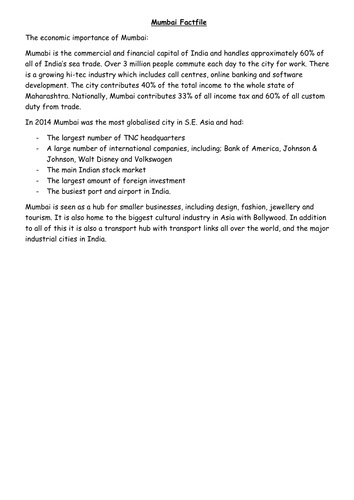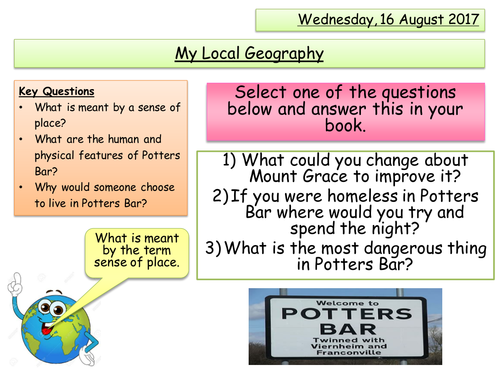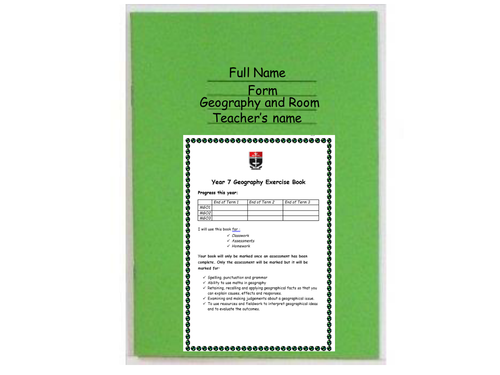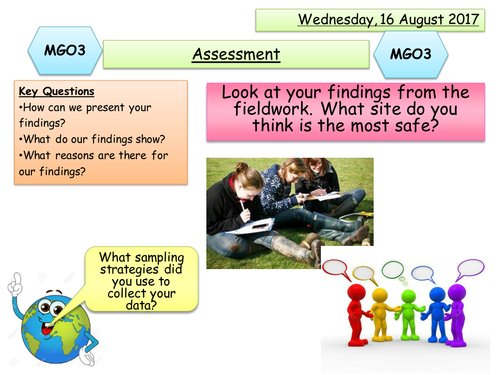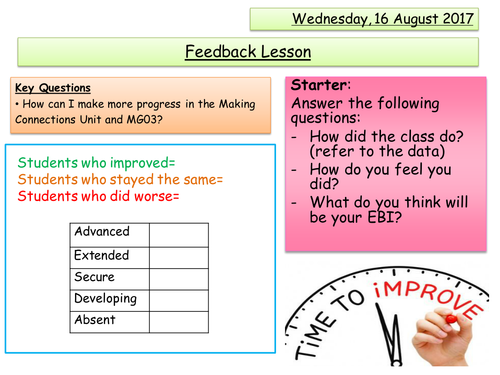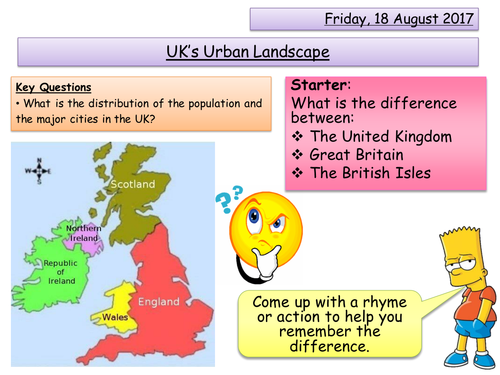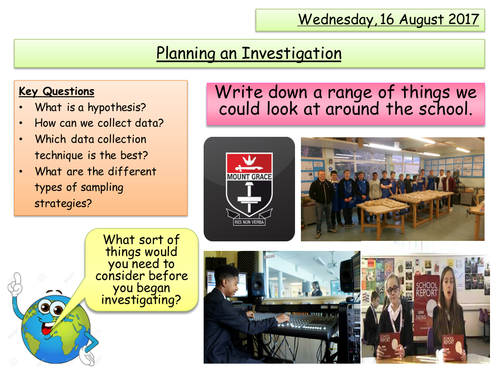
156Uploads
234k+Views
294k+Downloads
All resources

Desert Opportunities - Qatar
This lesson is based around the new AQA GCSE specification. This is a lesson in the unit titled Living World. The main aim of this lesson is to cover the following element of the specification:
A case study of a hot desert to illustrate:
- Development opportunities in hot desert environments: mineral extraction, energy, farming, tourism
NOTE - When it refers to page numbers please refer to the information provided.

Challenges of Deserts - Qatar
This lesson is based around the new AQA GCSE specification. This is a lesson in the unit titled Living World. The main aim of this lesson is to cover the following element of the specification:
A case study of a hot desert to illustrate:
- Challenges of developing hot desert environments: extreme temperatures, water supply, inaccessibility.
NOTE - When it refers to page numbers please refer to the information provided.

A Major City - Mumbai's Importance
This lesson is the first part of the major city you must cover in the new AQA GCSE specification. This lesson aims to cover the following element from the specification:
- The location and importance of the city, regionally, nationally and internationally.
- Causes of growth: natural increase and migration
NOTE = When it refers to a page number please use the factfile provided.

Geography in the news
This lesson aims to get students thinking about how geography is represented in the news, whilst also ensuring students understand the difference between social, economic and environmental. By the end of the lesson students will be able to answer the following key questions:
What does social, economic and environmental mean?
How does geography link to the news?
What types of geography are located in the news?

Sense of Place
This lesson aims to get students thinking about the term sense of place, by looking at their local place. In this case Potters Bar. Although this lesson is based around Potters Bar, it can be easily adapted to fit your own individual place. By the end of the lesson students will be able to answer the following key questions:
What is meant by a sense of place?
What are the human and physical features of Potters Bar?
Why would someone choose to live in Potters Bar?

What are Extreme Environments
A lesson designed for KS3 Geography. This is lesson 1 from a unit titled Extreme Environments.
This lesson will allow students to answer the following key questions:
What are the characteristics of Polar and Hot Arid regions?
What are the main causes of extreme environments?

Migration and Urbanisation
This lesson is based around the new AQA GCSE Specification. This is the second lesson in the unit titled Urban Issues and Challenges. The main aim of this lesson is cover the following element of the specification:
- Factors affecting the rate of urbanisation – migration (push–pull theory), natural increase.

Welcome to Geography
An introduction to Geography for year 7's. This lesson will allow students to answer the following key questions:
What is considered to be geography?
Why is geography important?

Polar Regions
A lesson designed for KS3 Geography. This is lesson 2 from a unit titled Extreme Environments.
This lesson will allow students to answer the following key questions:
What are the characteristics of Polar regions?
How is global warming impacting polar regions?

People and Extreme Environments
A lesson designed for KS3 Geography. This is lesson 6 from a unit titled Extreme Environments.
This lesson will allow students to answer the following key questions:
Who lives in extreme environments?
How are their cultures different?

Planning an Investigation - Presentation, Analysis and Conclusion
This lesson aims to get students to think about how to present, analyse and draw conclusion from data they have collected in the field. This is the 2nd lesson and links to planning an investigation. It gets students to pick appropriate presentation methods, describe and explain their results and to draw conclusions of their investigation. By the end of the lesson students will be able to answer the following key questions:
How can we present your findings?
What do our findings show?
What reasons are there for our findings?

Fragile Extreme Environments
A lesson designed for KS3 Geography. This is lesson 5 from a unit titled Extreme Environments.
This lesson will allow students to answer the following key questions:
• Why are extreme environments fragile?

Hot Arid Regions
A lesson designed for KS3 Geography. This is lesson 3 from a unit titled Extreme Environments.
This lesson will allow students to answer the following key questions:
• What are the characteristics of hot arid regions?
• How is global warming impacting hot arid regions?

Animal and Plant Adaptation
A lesson designed for KS3 Geography. This is lesson 4 from a unit titled Extreme Environments.
This lesson will allow students to answer the following key questions:
• How do plants and animals adapt to survive in Hot Arid regions?

Sustainable Management of Extreme Environments
A lesson designed for KS3 Geography. This is lesson 8 from a unit titled Extreme Environments.
This lesson will allow students to answer the following key questions:
• What are the sustainable management strategies to protect extreme environments?
• How effective are they?

Planning an Investigation - Assessment Feedback
This lesson aims to get students to reflect on their assessment (titled planning an investigation - presentation, analysis and conclusion). It gets students to edit their work in an attempt to improve.

UK's Urban Landscape
This lesson is based around the new AQA GCSE Specification. This is a lesson in the unit titled Urban Issues and Challenges. The main aim of this lesson is cover the following element of the specification:
- Overview of the distribution of population and the major cities in the UK.
NOTE = When it refers to a page number the table is provided on the actual powerpoint, you will just need to enlarge this for students to see.

Threats to Extreme Environments
A lesson designed for KS3 Geography. This is lesson 7 from a unit titled Extreme Environments.
This lesson will allow students to answer the following key questions:
• What threatens extreme environments?
• To what extent can climate change be managed to reduce the threat on extreme environments?

Case Study, Example and Question Booklet
This resource is designed to help students revise their case studies and examples, before applying them to exam questions.
For each case study and example it shows the link to the specification and provides students with a clear structure on the information they need to include. Following each of these are exam questions with a structure for students to guide them in providing a detailed answer.
As this is a powerpoint, it makes it easy to change the case study and examples to the ones you use with your students.

Planning an Investigation
This lesson aims to get students involved in the planning of their own investigation. This is aimed at year 7, completing their very first piece of fieldwork. The fieldwork is based around locating the most unsafe location within their school. It gets students examining different data collection methods, and the sampling strategies they will use. Although this lesson mentions a school, it is easily adaptable to mention your own individual school. By the end of the lesson students will be able to answer the following key questions:
What is a hypothesis?
How can we collect data?
Which data collection technique is the best?
What are the different types of sampling strategies?

